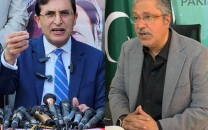Women abuse
An increased focus of religious sermons on ending violence against women can be a good teaching exercise

That Pakistan has been among the top few dangerous countries of the world for women is no more a secret. The unlawful and unethical behavioural practice is rampant in our part of the world in the shape of domestic abuse, rape, honour crimes, etc. Violence against women — mainly carried out by male members of family who consider it a right — is rather rising, even being practised as a custom in several parts of the country. And despite the growing focus by media and the civil society, the threat to women is mounting — even in their own homes and at the hands of their own family members.
We, as media representatives, have been consistently raising our voice and advocating why ending violence against women is vital for a peaceful society. Pressure groups and NGOs have also been doing their part for the cause. But a stronger voice has now emerged in a collective and organised manner against the abuse of women. Religious scholars from different schools of faith have called for ending all kinds of violence against women in order to build a peaceful society and maintain interfaith harmony. Part of a dialogue recently organised by the K-P Office of UN Women and the K-P’s EVAW Alliance, the scholars have signed a declaration condemning gender-based violence and vowing to spread awareness in their respective communities to put an end to the practice.
Since religious figures enjoy a good influence over people and have a good reach also, they can help a great deal in shaping the behaviour of local communities. An increased focus of religious sermons on ending violence against women can be a good teaching exercise and can make a notable difference over time. Prominent religious scholars can also use their influence with the official figures urging them to take meaningful steps to strengthen state-run social protection networks and ensure the provision of required support to vulnerable groups, especially women.
Published in The Express Tribune, December 9th, 2020.
Like Opinion & Editorial on Facebook, follow @ETOpEd on Twitter to receive all updates on all our daily pieces.















COMMENTS
Comments are moderated and generally will be posted if they are on-topic and not abusive.
For more information, please see our Comments FAQ